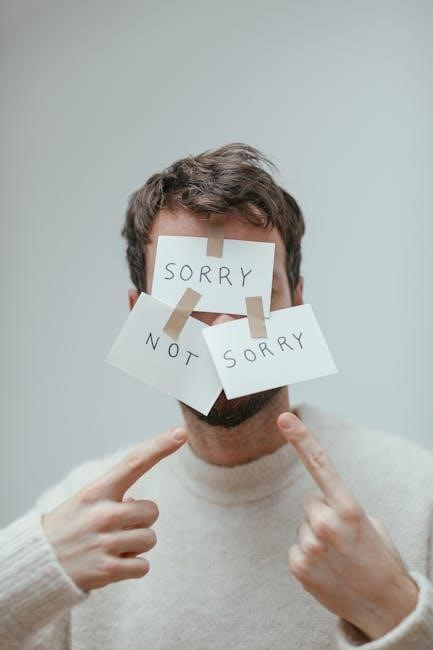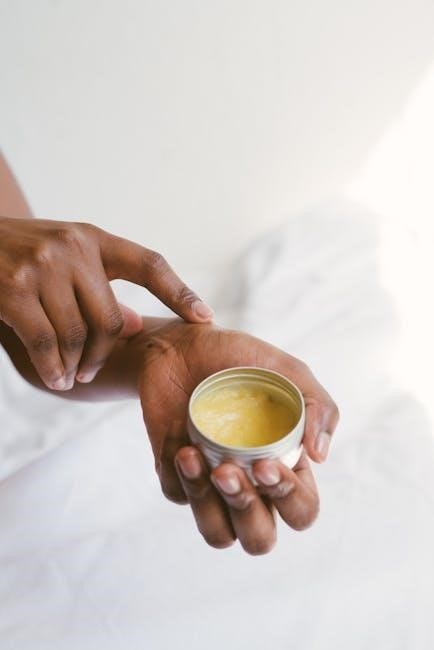“The Body Is Not an Apology” by Sonya Renee Taylor is a powerful call to embrace radical self-love‚ challenging societal norms and fostering body positivity. Available as a PDF‚ this transformative guide urges readers to reject body shame and celebrate their uniqueness‚ offering practical tools for personal and collective liberation.
1.1 Overview of the Book
“The Body Is Not an Apology” by Sonya Renee Taylor is a groundbreaking book that challenges societal beauty standards and advocates for radical self-love. Published in 2021 as a second edition‚ it explores themes of body positivity‚ self-care‚ and intersectionality‚ offering a comprehensive guide to embracing one’s uniqueness. The book emphasizes that health is a necessity‚ not a luxury‚ and encourages readers to listen to their bodies. Available as a PDF‚ it provides accessible tools for personal transformation and collective change‚ inspiring a movement toward self-acceptance and empowerment.
1.2 Author Background: Sonya Renee Taylor
Sonya Renee Taylor is a world-renowned activist‚ poet‚ and founder of The Body Is Not an Apology movement. She has dedicated her career to challenging body-based oppression and advocating for radical self-love. Taylor’s work emphasizes intersectionality‚ aiming to dismantle systemic inequalities and promote inclusivity. Her writing is deeply personal and transformative‚ offering readers tools to embrace their uniqueness. As a respected voice in the self-love movement‚ Taylor continues to inspire global change through her books and activism‚ empowering individuals to reclaim their bodies and lives with pride and confidence.
1.3 Key Themes and Messages
“The Body Is Not an Apology” explores themes of radical self-love‚ body positivity‚ and rejecting societal beauty standards. It emphasizes self-care as essential‚ not indulgent‚ and highlights the importance of listening to and honoring one’s body. The book challenges systemic oppression‚ including patriarchal and racial biases‚ that perpetuate body shame. Taylor advocates for embracing uniqueness and redefining health beyond physical appearance. Her message encourages personal empowerment and collective action to create a world where all bodies are valued and celebrated‚ fostering inclusivity and mental well-being.
1.4 Importance of the PDF Version
The PDF version of “The Body Is Not an Apology” ensures accessibility and convenience‚ allowing readers to engage with its transformative message anytime‚ anywhere. The digital format makes it easy to share and reference‚ enabling widespread dissemination of its radical self-love principles. Readers can highlight‚ annotate‚ and revisit key passages‚ enhancing their personal journey toward body positivity and empowerment. The PDF also preserves the book’s integrity‚ maintaining its powerful call to action for collective change and inclusivity in a portable‚ modern format.
The Concept of Radical Self-Love
Radical self-love is a revolutionary act of embracing and celebrating one’s body unconditionally‚ rejecting societal norms and fostering personal liberation. It empowers individuals to challenge systemic oppression and embrace their true selves‚ creating a foundation for collective transformation and healing.
2.1 Definition and Significance
Radical self-love is a transformative concept that challenges societal norms by embracing one’s body and identity without apology. It signifies a deep acceptance and celebration of oneself‚ rejecting oppressive systems that foster shame and negativity. This philosophy‚ as highlighted in The Body Is Not an Apology‚ empowers individuals to reclaim their worth‚ fostering resilience and liberation. By valuing self-love as a radical act‚ it becomes a powerful tool for personal healing and societal change‚ encouraging individuals to embrace their uniqueness and reject harmful beauty standards.

2.2 The Role of Self-Care in Radical Self-Love
Self-care is a cornerstone of radical self-love‚ serving as a powerful tool for healing and empowerment. It involves intentional practices that nurture the body‚ mind‚ and spirit‚ helping individuals embrace their worth without shame; In The Body Is Not an Apology‚ self-care is framed as an act of resistance against systemic oppression‚ encouraging individuals to prioritize their well-being. By integrating self-care into daily life‚ people can reclaim their bodies and dismantle harmful narratives‚ fostering a deeper connection to themselves and their humanity.
2.3 Intersectionality in Self-Love Practices
Intersectionality is central to radical self-love‚ acknowledging how race‚ gender‚ class‚ and other identities intersect to shape experiences of body oppression. In The Body Is Not an Apology‚ Sonya Renee Taylor emphasizes that self-love practices must consider these intersections‚ addressing how marginalized communities face unique challenges in embracing their bodies. By recognizing systemic inequalities‚ radical self-love becomes a tool for liberation‚ encouraging individuals to honor their full selves and dismantle oppressive narratives that perpetuate body shame and exclusion.
2.4 Personal Empowerment Through Radical Self-Love
Radical self-love empowers individuals to reclaim their autonomy and challenge societal norms. By embracing their true selves‚ people break free from oppressive beauty standards and foster resilience. This practice encourages self-acceptance‚ enabling individuals to reject shame and embrace their uniqueness. Taylor’s work highlights how radical self-love transforms lives‚ allowing individuals to redefine health and beauty on their own terms. It becomes a powerful tool for personal liberation‚ helping individuals and communities dismantle systemic oppression and cultivate a culture of acceptance and empowerment.
The Importance of Body Positivity
Body positivity challenges societal beauty standards‚ promoting self-acceptance and self-esteem. It encourages embracing uniqueness and rejecting unrealistic ideals‚ fostering mental health and confidence‚ as highlighted in the PDF.
3.1 Breaking Societal Beauty Standards
Societal beauty standards often impose unrealistic ideals‚ fostering body shame and dissatisfaction. The Body Is Not an Apology challenges these norms‚ advocating for self-acceptance and rejecting narrow definitions of beauty. By embracing body uniqueness‚ individuals can break free from oppressive standards that perpetuate inequality. The PDF emphasizes the importance of celebrating diverse bodies‚ promoting mental well-being and confidence. This radical shift encourages individuals to redefine beauty on their own terms‚ fostering inclusivity and self-love.
3.2 Embracing Body Uniqueness
Every body is unique and deserving of love and respect. The Body Is Not an Apology encourages individuals to reject societal expectations and embrace their distinct features. The PDF highlights that bodies are not flawed but rather miracles‚ worthy of celebration. By shifting from shame to pride‚ people can reclaim their bodies as sources of strength and confidence. This radical perspective fosters self-acceptance‚ encouraging individuals to honor their individuality and reject harmful beauty norms that perpetuate inequality and self-doubt. Radical self-love becomes a powerful tool for personal and collective liberation.
3.3 The Link Between Body Positivity and Mental Health
Body positivity has a profound impact on mental health‚ reducing anxiety‚ depression‚ and low self-esteem. By embracing body positivity‚ individuals can break free from harmful societal beauty standards‚ fostering self-acceptance and confidence. The Body Is Not an Apology emphasizes that rejecting body shame and loving oneself is essential for mental well-being. The PDF version offers tools and affirmations to help readers cultivate positive body image‚ promoting a healthier mindset and resilience against negative societal pressures. This transformative approach supports overall mental health and personal growth.
3.4 The Impact of Media on Body Image
Media profoundly shapes body image by promoting unattainable beauty standards‚ often leading to body dissatisfaction and low self-esteem. The constant exposure to idealized images perpetuates body shame‚ particularly among marginalized groups. The Body Is Not an Apology addresses this by encouraging radical self-love and rejection of these harmful narratives. The PDF version provides tools to critically analyze media influences‚ fostering a healthier relationship with one’s body and promoting self-acceptance in a society dominated by unrealistic beauty ideals.
Societal Impact and Systems of Oppression
Societal systems‚ including patriarchy and capitalism‚ enforce body-based oppression‚ perpetuating harmful beauty standards and discrimination. The Body Is Not an Apology highlights these injustices‚ advocating radical self-love as resistance.

4.1 Body-Based Oppression: A Historical Perspective
Body-based oppression has deep historical roots‚ with societal systems perpetuating shame and discrimination. Patriarchy‚ racism‚ and capitalism have fueled these injustices‚ creating harmful norms. Taylor’s work reveals how these systems have historically policed bodies‚ leading to internalized shame. By examining this history‚ readers understand how body-based oppression is not innate but constructed. This awareness is crucial for dismantling systemic violence and embracing radical self-love as a form of resistance and liberation.
4.2 The Role of Patriarchy in Body Shaming
Patriarchy perpetuates body shaming by enforcing rigid beauty standards‚ marginalizing diverse bodies‚ and fostering self-doubt. These norms disproportionately affect women‚ particularly those of color‚ fat individuals‚ and those with disabilities. Taylor argues that patriarchal systems profit from body shame‚ selling unattainable ideals. Radical self-love challenges these oppressive norms‚ encouraging individuals to reclaim their bodies and reject societal conditioning. By addressing patriarchy’s role‚ Taylor empowers readers to dismantle internalized shame and embrace their true selves‚ fostering liberation and self-acceptance.
4.3 Racial and Ethnic Discrimination in Body Perception
Racial and ethnic discrimination deeply influence body perception‚ perpetuating Eurocentric beauty standards that marginalize non-white bodies. Sonya Renee Taylor highlights how systemic racism and historical oppression have led to internalized racism and body shame. Bodies of color are often hypersexualized or invisibilized‚ further alienating individuals from their natural beauty. Radical self-love challenges these narratives‚ encouraging individuals to reclaim their bodies and celebrate their cultural identity. By addressing these injustices‚ Taylor advocates for a world where all bodies are valued and respected‚ fostering inclusivity and healing.
4.4 Economic Systems and Body Image
Economic systems significantly shape body image‚ as capitalism profits from body insecurity. The beauty and diet industries thrive by selling unattainable beauty standards‚ perpetuating body dissatisfaction. Taylor emphasizes how consumer culture commodifies bodies‚ fostering self-hatred to drive consumption. Marginalized groups‚ particularly women and people of color‚ face heightened exploitation. Radical self-love resists these systems by rejecting the notion that bodies must conform to market-driven ideals‚ advocating for a world where bodies are valued beyond their economic worth.
The Power of Radical Self-Love as a Movement
Rising from Sonya Renee Taylor’s transformative vision‚ radical self-love has become a global movement‚ inspiring millions to embrace their bodies and dismantle oppressive systems through collective empowerment.
5.1 The Origins of the Movement
The radical self-love movement‚ sparked by Sonya Renee Taylor‚ began as a simple yet profound statement: “The body is not an apology.” This mantra‚ born from a conversation with a friend‚ evolved into a global call to action. Taylor’s work challenges systemic oppression and encourages individuals to embrace their bodies without shame. The movement gained momentum through social media‚ workshops‚ and the publication of The Body Is Not an Apology‚ inspiring a worldwide community to reject societal beauty standards and advocate for self-acceptance. Its roots in personal empowerment have grown into a cultural shift‚ emphasizing the importance of radical self-love as a tool for liberation.
5.2 Key Figures and Influencers
Sonya Renee Taylor‚ author of The Body Is Not an Apology‚ is the founder of the radical self-love movement. Her work has inspired countless individuals to embrace body positivity and reject societal beauty standards. Kimberlé Crenshaw‚ a prominent scholar on intersectionality‚ has also influenced the movement by highlighting how systemic oppression intersects with body image. These key figures‚ along with activists and writers like Brene Brown and Audre Lorde‚ have shaped the conversation around self-love and empowerment‚ creating a powerful collective voice for change.
5.3 Global Reach and Cultural Adaptations
The message of The Body Is Not an Apology has resonated globally‚ with the PDF version making it accessible to readers worldwide. The book’s emphasis on radical self-love has been embraced by diverse cultures‚ inspiring local movements that adapt its principles to unique societal contexts. From workshops in Africa to digital communities in Asia‚ the movement has evolved into a global phenomenon‚ proving that body positivity and self-love transcend borders‚ fostering unity and empowerment across cultures.

5.4 The Role of Social Media in Amplifying the Message
Social media has played a pivotal role in spreading the message of The Body Is Not an Apology. Platforms like YouTube‚ Instagram‚ and Twitter have become spaces for sharing stories‚ PDF resources‚ and discussions on radical self-love. The book’s ideas have gone viral‚ with hashtags and online communities fostering global conversations. The accessibility of the PDF version has further enabled its widespread dissemination‚ making it easier for individuals worldwide to engage with its transformative principles and join the movement toward body positivity and self-acceptance.
Practical Tools for Radical Self-Love
The Body Is Not an Apology offers practical tools like affirmations‚ self-care routines‚ and boundary-setting to help individuals embrace radical self-love and improve their well-being.
6.1 Affirmations and Daily Practices
Affirmations are a cornerstone of radical self-love‚ helping to combat negative self-talk and societal conditioning. Daily practices like repeating phrases such as “My body is not an apology” or “I choose to love myself fully” foster self-acceptance. These tools‚ outlined in the PDF‚ empower individuals to reframe their mindset‚ embracing their uniqueness and rejecting harmful beauty standards. By integrating these practices into daily life‚ readers can cultivate a deeper connection to their bodies and minds‚ promoting lasting self-love and personal growth.

6.2 Building Self-Care Routines
Building self-care routines is a vital part of radical self-love‚ as outlined in the PDF. These practices encourage individuals to prioritize their well-being by creating intentional habits. Self-care is not a luxury but a necessity‚ fostering physical‚ emotional‚ and mental health. By listening to their bodies and honoring their needs‚ readers can develop routines that nurture their entire being. This section emphasizes the importance of consistency and self-compassion‚ helping individuals cultivate a deeper connection with themselves and embrace their worthiness of care and love.
6.3 Navigating Difficult Emotions
Navigating difficult emotions is a cornerstone of radical self-love‚ as explored in the PDF. Sonya Renee Taylor emphasizes that these emotions often stem from societal conditioning and body-based oppression. The book offers practical tools like affirmations and journaling to process pain and shame‚ encouraging readers to embrace their emotions as opportunities for healing. By addressing these feelings‚ individuals can shift from self-criticism to self-compassion‚ fostering a deeper connection with their bodies and minds. This process is essential for building resilience and reclaiming one’s humanity in a world that often seeks to diminish it.
6.4 Setting Boundaries for Personal Well-Being
Setting boundaries is a crucial aspect of radical self-love‚ as discussed in the PDF. Sonya Renee Taylor highlights that boundaries are not limitations but acts of self-respect‚ protecting one’s energy and mental health. By learning to say “no” and prioritize personal needs‚ individuals can challenge societal expectations and reclaim their power. Boundaries also serve as a shield against body shaming and oppressive systems‚ fostering a deeper connection to self-worth. This practice is essential for healing and maintaining emotional and physical well-being in a world that often demands conformity. Boundaries empower individuals to honor their bodies and minds unapologetically.
The Workbook: Tools for Living Radical Self-Love
Your Body Is Not an Apology Workbook offers practical tools for embracing radical self-love‚ including affirmations‚ journaling prompts‚ and actionable steps to dismantle body shame and foster empowerment.
7.1 Overview of the Workbook
Your Body Is Not an Apology Workbook is a companion guide to Sonya Renee Taylor’s book‚ offering practical tools for radical self-love. It includes affirmations‚ journaling exercises‚ and actionable steps to help readers dismantle body shame and embrace their uniqueness. The workbook emphasizes self-care‚ boundary-setting‚ and empowerment‚ providing a structured path for personal growth. Available as a PDF‚ it serves as a transformative resource for individuals seeking to cultivate radical self-love and live authentically. Its exercises are designed to foster healing‚ confidence‚ and a deeper connection to one’s body.
7.2 Exercises for Self-Reflection
The workbook offers a variety of exercises designed to guide readers in exploring their relationship with their bodies. These activities encourage introspection‚ helping individuals identify and challenge societal beauty standards and personal beliefs about their bodies. Through journaling prompts and transformative practices‚ readers are invited to confront body shame and cultivate self-acceptance. The exercises are introspective and empowering‚ fostering a deeper connection to one’s body and promoting radical self-love. Available in the PDF version‚ these tools are accessible for anyone seeking to embark on a journey of self-discovery and healing.
7.3 Actionable Steps for Radical Self-Love
The workbook provides clear‚ actionable steps to help readers cultivate radical self-love. These include daily affirmations‚ boundary-setting practices‚ and self-care routines tailored to individual needs. Readers are encouraged to listen to their bodies and honor their uniqueness. The exercises emphasize self-compassion and empowerment‚ offering practical ways to dismantle societal conditioning. Available in the PDF version‚ these steps are designed to foster lasting transformation‚ helping individuals embrace their bodies without apology and live authentically. The guide is both accessible and impactful‚ making radical self-love achievable for everyone.
7.4 Community Building Through Shared Practices
The workbook fosters community building by encouraging shared practices that promote connection and mutual support. Readers are invited to engage in group activities‚ such as guided discussions and collective affirmations‚ to create inclusive spaces for healing. The PDF version includes exercises designed to break isolation and build bridges between individuals. By sharing radical self-love practices‚ communities can collectively dismantle oppressive systems and celebrate diverse bodies. This approach strengthens the movement‚ creating a supportive environment for sustained growth and empowerment.
The Role of Health and Wellness
Sonya Renee Taylor redefines health and wellness beyond physical appearance‚ emphasizing mental well-being and self-care as essential acts of love. The PDF highlights nourishment and movement as tools for radical self-love‚ fostering a holistic approach to body positivity and empowerment.
8.1 Redefining Health Beyond Physical Appearance
The Body Is Not an Apology challenges traditional notions of health‚ focusing on mental well-being and self-care as vital components. Taylor emphasizes that health is not solely about physical appearance but encompasses emotional and spiritual nourishment. By prioritizing self-love and rejecting societal beauty standards‚ individuals can embrace a holistic approach to wellness. The PDF version highlights how movement and mindful eating are acts of love‚ empowering individuals to redefine health on their own terms‚ fostering a deeper connection with their bodies and selves.
8.2 The Importance of Mental Health in Self-Love
Mental health is a cornerstone of radical self-love‚ as emphasized in The Body Is Not an Apology. Taylor highlights the necessity of prioritizing emotional well-being‚ recognizing that societal pressures often erode self-esteem. By embracing mindfulness and self-compassion‚ individuals can heal from internalized shame. The PDF version underscores the importance of nourishing both mind and body‚ rejecting harmful beauty standards‚ and fostering resilience. Mental health is not just a personal journey but a vital step toward collective liberation and self-love.
8.3 Nourishment as an Act of Love
Nourishment is a profound act of self-love‚ as highlighted in The Body Is Not an Apology. Taylor emphasizes that feeding our bodies with care and intention is a radical form of love‚ rejecting societal norms that equate self-worth with deprivation. The PDF version underscores that health is not a luxury but a necessity‚ encouraging individuals to embrace nourishment as a holistic practice. By prioritizing self-care and rejecting shame‚ we reclaim our bodies as deserving of love‚ healing‚ and sustenance.
8.4 Movement and Physical Expression
Movement and physical expression are celebrated in The Body Is Not an Apology as acts of radical self-love. Taylor encourages embracing bodily autonomy through dance‚ exercise‚ or simply occupying space without shame. The PDF highlights how movement becomes a form of resistance against societal norms that restrict bodies. By reclaiming physical expression‚ individuals affirm their worth and challenge oppressive systems. This practice fosters empowerment‚ joy‚ and a deeper connection to one’s body‚ aligning with the book’s mission of radical self-love and liberation.
The Collective Journey Toward Radical Self-Love
The collective journey emphasizes collaboration and shared practices to dismantle oppression. The Body Is Not an Apology PDF inspires a global movement‚ fostering inclusivity and empowerment through radical self-love.
9.1 The Power of Community
Community plays a vital role in fostering radical self-love by providing shared experiences and support. The Body Is Not an Apology PDF encourages collective action‚ helping individuals break free from societal barriers. Through shared practices and discussions‚ communities amplify personal empowerment‚ creating a united front against body-based oppression. This collective journey not only heals individuals but also challenges systemic injustices‚ proving that together‚ we can build a more inclusive and loving world. The PDF serves as a powerful tool for community workshops and group activities‚ further strengthening the movement.
9.2 Dismantling Systemic Oppression Together
Dismantling systemic oppression requires collective responsibility and action. Radical self-love‚ as highlighted in The Body Is Not an Apology PDF‚ challenges oppressive systems that perpetuate body shame and inequality. By addressing intersecting forms of discrimination‚ individuals and communities can collectively heal and resist. The PDF emphasizes the importance of unity in breaking down barriers‚ fostering a world where all bodies are valued. Together‚ we can dismantle oppressive structures and create a more just and inclusive society‚ empowering everyone to embrace their true selves.
9.3 Celebrating Diversity and Inclusivity
Celebrating diversity and inclusivity is central to radical self-love‚ as emphasized in The Body Is Not an Apology PDF. The book challenges societal norms that marginalize certain bodies‚ promoting acceptance of all races‚ genders‚ sizes‚ and abilities. By embracing diversity‚ individuals foster a culture of inclusivity‚ where everyone feels valued. This collective celebration dismantles oppressive standards‚ empowering people to love themselves and others without condition. The PDF serves as a powerful tool for creating a more inclusive and compassionate world‚ one that honors every body’s uniqueness and worth.
9.4 Creating a Supportive Environment
Creating a supportive environment is essential for fostering radical self-love and dismantling systemic oppression. The PDF version of “The Body Is Not an Apology” emphasizes the importance of safe spaces where individuals can share experiences and heal collectively. By promoting open dialogue‚ active listening‚ and mutual respect‚ communities can nurture environments that celebrate all bodies. This collective support system encourages individuals to embrace their uniqueness and empowers them to challenge societal norms‚ ultimately fostering a culture of inclusivity and acceptance.
“The Body Is Not an Apology” is a transformative guide to radical self-love‚ urging readers to embrace their uniqueness and reject societal norms. The PDF version offers practical tools for personal empowerment and collective change‚ encouraging individuals to take action for a more inclusive world. Share this vital message and continue the journey toward self-love and liberation with the resources provided in the book.
10.1 The Significance of “The Body Is Not an Apology”
“The Body Is Not an Apology” is a groundbreaking work that challenges societal norms and fosters self-acceptance. Sonya Renee Taylor’s book‚ available as a PDF‚ emphasizes radical self-love as a powerful tool for personal and collective liberation. It encourages readers to reject body shame and embrace their uniqueness‚ promoting a world where all bodies are valued. The book’s significance lies in its ability to inspire transformation‚ offering practical advice and fostering a movement toward inclusivity and empowerment. Its message resonates globally‚ making it a vital resource for anyone seeking self-love and liberation.

10.2 Encouraging Others to Embrace Radical Self-Love
Encouraging others to embrace radical self-love involves fostering a supportive environment where individuals feel empowered to celebrate their unique bodies. By sharing the principles of “The Body Is Not an Apology”‚ available as a PDF‚ readers can inspire others to reject societal beauty standards and embrace their true selves. This collective journey toward self-acceptance creates a ripple effect‚ promoting inclusivity and challenging systemic oppression. Empowering others to love themselves radically fosters a more compassionate and equitable world‚ emphasizing that self-love is not selfish but essential for collective liberation.
10.3 Taking Action for Personal and Collective Change
Taking action for personal and collective change involves embracing radical self-love as a catalyst for transformation. The PDF guide‚ “The Body Is Not an Apology”‚ provides practical tools to challenge societal norms and dismantle body-based oppression. Individuals can start by practicing self-care‚ advocating for inclusivity‚ and supporting others in their journeys. Collective action fosters a community that celebrates diversity‚ promoting a world where all bodies are valued. By taking intentional steps‚ individuals can create lasting change‚ both personally and societal‚ inspiring a culture of acceptance and empowerment.

10.4 The Future of Radical Self-Love
The future of radical self-love lies in its global adaptation and cultural evolution‚ as emphasized in the PDF version of “The Body Is Not an Apology”. By integrating radical self-love into education‚ media‚ and policy‚ societies can foster inclusivity and dismantle oppressive systems. The movement will continue to grow through social media‚ inspiring new generations to embrace body positivity and mental well-being. As individuals and communities unite‚ radical self-love will become a cornerstone of a more equitable and compassionate world‚ ensuring that all bodies are celebrated and valued.



